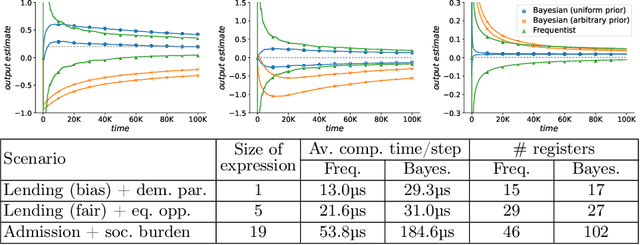Mahyar Karimi
Employee Turnover Analysis Using Machine Learning Algorithms
Feb 06, 2024Abstract:Employee's knowledge is an organization asset. Turnover may impose apparent and hidden costs and irreparable damages. To overcome and mitigate this risk, employee's condition should be monitored. Due to high complexity of analyzing well-being features, employee's turnover predicting can be delegated to machine learning techniques. In this paper, we discuss employee's attrition rate. Three different supervised learning algorithms comprising AdaBoost, SVM and RandomForest are used to benchmark employee attrition accuracy. Attained models can help out at establishing predictive analytics.
Monitoring Algorithmic Fairness
May 25, 2023

Abstract:Machine-learned systems are in widespread use for making decisions about humans, and it is important that they are fair, i.e., not biased against individuals based on sensitive attributes. We present runtime verification of algorithmic fairness for systems whose models are unknown, but are assumed to have a Markov chain structure. We introduce a specification language that can model many common algorithmic fairness properties, such as demographic parity, equal opportunity, and social burden. We build monitors that observe a long sequence of events as generated by a given system, and output, after each observation, a quantitative estimate of how fair or biased the system was on that run until that point in time. The estimate is proven to be correct modulo a variable error bound and a given confidence level, where the error bound gets tighter as the observed sequence gets longer. Our monitors are of two types, and use, respectively, frequentist and Bayesian statistical inference techniques. While the frequentist monitors compute estimates that are objectively correct with respect to the ground truth, the Bayesian monitors compute estimates that are correct subject to a given prior belief about the system's model. Using a prototype implementation, we show how we can monitor if a bank is fair in giving loans to applicants from different social backgrounds, and if a college is fair in admitting students while maintaining a reasonable financial burden on the society. Although they exhibit different theoretical complexities in certain cases, in our experiments, both frequentist and Bayesian monitors took less than a millisecond to update their verdicts after each observation.
Runtime Monitoring of Dynamic Fairness Properties
May 08, 2023


Abstract:A machine-learned system that is fair in static decision-making tasks may have biased societal impacts in the long-run. This may happen when the system interacts with humans and feedback patterns emerge, reinforcing old biases in the system and creating new biases. While existing works try to identify and mitigate long-run biases through smart system design, we introduce techniques for monitoring fairness in real time. Our goal is to build and deploy a monitor that will continuously observe a long sequence of events generated by the system in the wild, and will output, with each event, a verdict on how fair the system is at the current point in time. The advantages of monitoring are two-fold. Firstly, fairness is evaluated at run-time, which is important because unfair behaviors may not be eliminated a priori, at design-time, due to partial knowledge about the system and the environment, as well as uncertainties and dynamic changes in the system and the environment, such as the unpredictability of human behavior. Secondly, monitors are by design oblivious to how the monitored system is constructed, which makes them suitable to be used as trusted third-party fairness watchdogs. They function as computationally lightweight statistical estimators, and their correctness proofs rely on the rigorous analysis of the stochastic process that models the assumptions about the underlying dynamics of the system. We show, both in theory and experiments, how monitors can warn us (1) if a bank's credit policy over time has created an unfair distribution of credit scores among the population, and (2) if a resource allocator's allocation policy over time has made unfair allocations. Our experiments demonstrate that the monitors introduce very low overhead. We believe that runtime monitoring is an important and mathematically rigorous new addition to the fairness toolbox.
 Add to Chrome
Add to Chrome Add to Firefox
Add to Firefox Add to Edge
Add to Edge